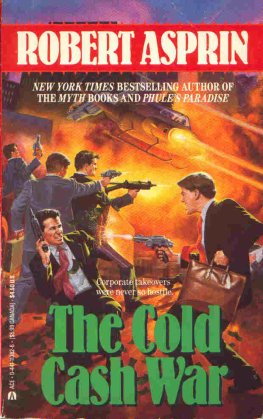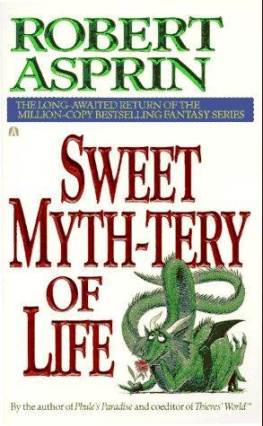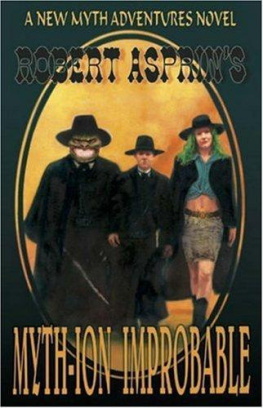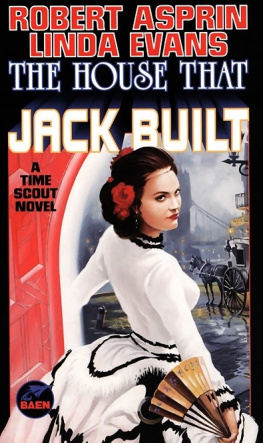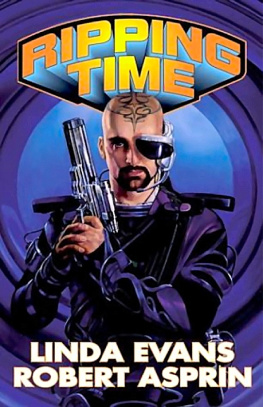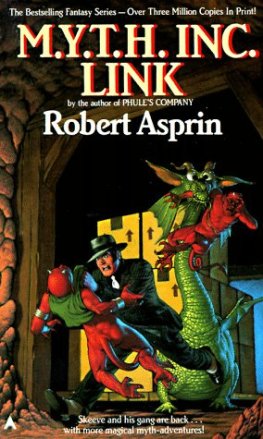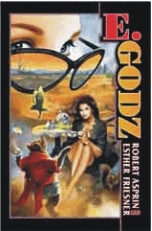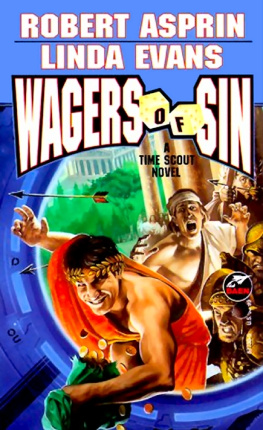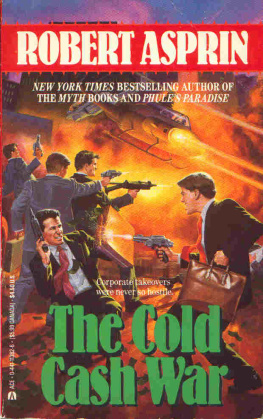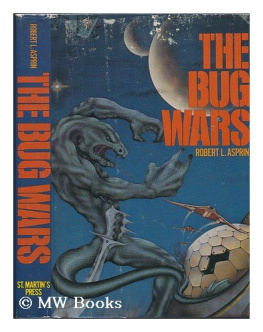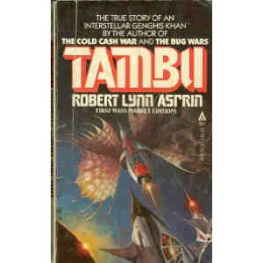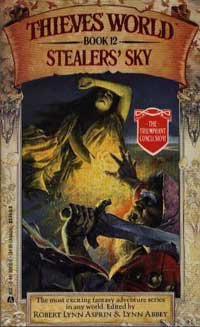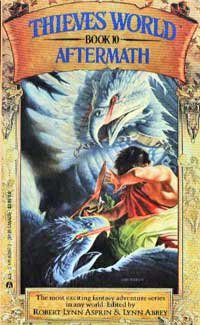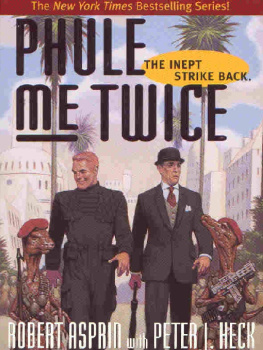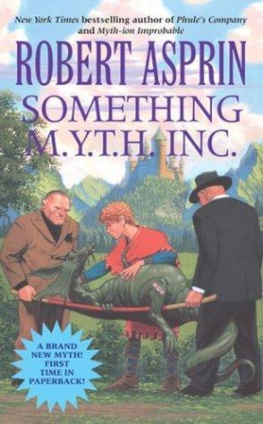Robert Asprin - The Cold Cash War
Here you can read online Robert Asprin - The Cold Cash War full text of the book (entire story) in english for free. Download pdf and epub, get meaning, cover and reviews about this ebook. genre: Science fiction. Description of the work, (preface) as well as reviews are available. Best literature library LitArk.com created for fans of good reading and offers a wide selection of genres:
Romance novel
Science fiction
Adventure
Detective
Science
History
Home and family
Prose
Art
Politics
Computer
Non-fiction
Religion
Business
Children
Humor
Choose a favorite category and find really read worthwhile books. Enjoy immersion in the world of imagination, feel the emotions of the characters or learn something new for yourself, make an fascinating discovery.
- Book:The Cold Cash War
- Author:
- Genre:
- Rating:3 / 5
- Favourites:Add to favourites
- Your mark:
- 60
- 1
- 2
- 3
- 4
- 5
The Cold Cash War: summary, description and annotation
We offer to read an annotation, description, summary or preface (depends on what the author of the book "The Cold Cash War" wrote himself). If you haven't found the necessary information about the book — write in the comments, we will try to find it.
The Cold Cash War — read online for free the complete book (whole text) full work
Below is the text of the book, divided by pages. System saving the place of the last page read, allows you to conveniently read the book "The Cold Cash War" online for free, without having to search again every time where you left off. Put a bookmark, and you can go to the page where you finished reading at any time.
Font size:
Interval:
Bookmark:
Robert Asprin
The Cold Cash War
1
Tom Mausier was a cautious man. Despite his daydreams of bravery and glorious deeds, he had to agree with his friends that he was one of the most cautious of people. As such, while it surprised everyone that he left his comfortable corporate job to open a business of his own, no one was surprised when it succeeded. Had success not been almost guaranteed in the beginning, he would not have made the move.
Still he had his dreams. He dreamed of being an adventurer. A secret agent. A spy. Lacking the dash and courage to be any of these, he contented himself with the small pride of being his own man and running the business he had built as an espionage and information broker.
His day began at six o'clock in the morning, fully two hours before any of his employees arrived. This was not difficult for him since his offices were attached to his house. In fact, he could enter his office through a door in his kitchen. However, he never went into the office unless he was properly dressed. It would have been as unthinkable to him as walking outside in his underwear. The offices were another world to him, a world of business and of dreams, while his home was his home.
One could notice a physical change when he stepped through the door joining the two worlds. His home was kept at a comfortable seventy-eight degrees; the office was a more crisp and businesslike sixty-seven degrees. His wife maintained a modest and comfortable early American decor with a few tasteful and functional antiques in their home, but his office-his office was his pride and joy.
Stepping into his office was like stepping onto the deck of a Hollywood spaceship when the budget was both lavish and overspent. While his home was comfortably frugal, he spared no expense on his office. Electronic display screens and their telephone terminal hookups lined the walls as well as machines for recording and storing incoming messages. Gadgetry abounded everywhere, almost all of which he could justify.
His business was his pride, and he started at six o'clock sharp. He didn't require his employees to match his hours; in fact, he discouraged them from coming in early. The first two hours of each day were for him to collect his thoughts, organize the day, and pursue his hobby.
This morning started out the same as any other. Without bothering to turn on the overhead lights, he switched on the first two viewscreens and studied them carefully. The first showed memos to himself of items to be done today. They were either dictated at his desk into the memory file or phoned in by him from one of the phones in his home or a nearby phone booth when a thought struck him. The latter was done with one of the portable field terminals identical to the ones issued to their field agents and it always gave him a secret thrill to use one, even though the data he transmitted to himself was usually of an unexciting nature.
Today's data was as dull as ever. ISSUE PAYROLL CHECKS...RECONCILE THE PHONE BILL...SPEAK TO MS. WITLEY ABOUT HER STEADILY LENGTHENING LUNCH HOURS...He sighed as he scanned the board. Paperback spies never had to reconcile phone bills. Such tasks were magically done by elves or civil servants offstage, leaving the heroes free to gamble in posh casinos with beautiful women on their arms and strange people shooting at them.
One item on the board caught his eye. CHECK MISSED RENDEZVOUS 187-449-3620. He scowled thoughtfully. He'd have to check that carefully. If the agent had missed the rendezvous because of laxness, he would be dropped as a client. Thomas Mausier didn't tolerate laxness. His own reputation was on the line. All of his clients could deal with each other in good faith because Thomas Mausier vouched for them. If a purchasing client didn't pay in full or attempted a doublecross, he would be dropped. If a selling client tried to palm off falsified or dummied information, he would be dropped. When you dealt through Thomas Mausier, you dealt honestly and in good faith. That's part of what you were paying him his ten percent for.
Then again, there might be a good reason why the agent missed the rendezvous. He might be dead. If that were the case, Mausier would have to check to see if the scrambler unit on the agent's field terminal had been somehow neutralized, allowing a rival to intercept the message and set an ambush.
Mausier doubted that this had occurred. He had countless guarantees from the Japanese firm that custom-manufactured the units for him that the scramblers were individually unique and unbuggable, and they had yet to be proven wrong.
Still, it would be worth checking into. His eyes flicked over the agent's client number-187. Brazil. He'd have to pay particular attention to items from that area when he went through the newswire tapes, newspapers, and periodicals this morning.
He was still pondering this as he turned to the second board. This board contained both requests for information and items for sale from the world of corporations which had been phoned in during the night. Again the items were of a routine nature. Now that the Christmas production lines had started, the seasonal rush for information on new designs from rival toy companies was dwindling. The majority of items were from corporate executives checking on each other, frequently within the same organization.
Again an item caught his eye, but this time he smiled. A corporation was asking for information on the design of an electronics gizmo that had appeared in detail in last month's issue of a popular hobbyists' magazine. They were offering a healthy sum. Still smiling, Mausier keyed in the magazine reference and coded it back to the requestor with the footnote "With our compliments."
There would be red faces when the message was picked up, but what the heck, they didn't have the time for reading that Mausier had. They were chained to a corporation. Better that they got a little embarrassed than if he let one of his agents sell them information that was already public knowledge. He had his reputation to protect.
Again he scanned the board, automatically assigning codes to the items. When his employees arrived, they would spend hours coding the new data into the computers, but he could do it in minutes. After all, he had invented the code.
Each item requested would be encoded with the geographic region for which information was available, the specifics of the information required, the date it was needed, and the offered price. Any agent could then step into a phone booth or pick up a motel phone anywhere in the world, and, using his field terminal, review all requests for information in this area. Similarly, any item offered for sale would be encoded with the general category of interest, the specifics of the information, and the asking price. The buying clients would then use their field terminals to scan for any items that might be of particular interest to them. This system allowed both speculative and consignment espionage to be channeled through his brokerage, with Mausier arranging the details and collecting his ten percent.
With relish he turned on the next board. This board got less use than the corporate one, but was always more exciting. This board was for governments.
There was a new message on the board this morning. It was a request for information. It was a request from the C-Block.
Mausier leaned forward and studied the request. Since the C-Block had gone incommunicado after the end of the Russo-Chinese War, no information had come out, but they were always buying. Even though it was known that their own agents roamed the far corners of the globe, they still dealt with him and probably other information brokers. Whether this was to obtain new lines of information or to check on data sent them by their own agents no one knew, but they were steady customers.
Font size:
Interval:
Bookmark:
Similar books «The Cold Cash War»
Look at similar books to The Cold Cash War. We have selected literature similar in name and meaning in the hope of providing readers with more options to find new, interesting, not yet read works.
Discussion, reviews of the book The Cold Cash War and just readers' own opinions. Leave your comments, write what you think about the work, its meaning or the main characters. Specify what exactly you liked and what you didn't like, and why you think so.

